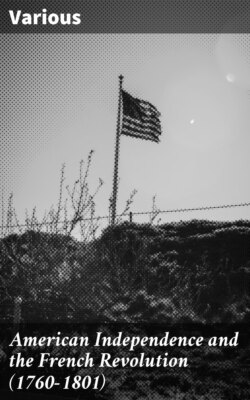Читать книгу American Independence and the French Revolution (1760-1801) - Various - Страница 13
На сайте Литреса книга снята с продажи.
TOWNSHEND’S CONTUMACY (1767).
Source.—Correspondence of William Pitt, Earl of Chatham. Vol. iii., pp. 233 et seq. London, 1838–1840.
ОглавлениеTable of Contents
Mr. Townshend then mentioned the extraordinaries of America, and the necessity of voting a particular sum; which he said he neither could nor would move, unless the cabinet previously took the whole state of America into consideration, and enabled him to declare to the House the opinion of administration as to the forts, the Indian trade, the disposition of the troops, in short the whole arrangements, considered with a view to a general reduction of expense, and a duty which he undertook should be laid to defray what remained: that he had promised this to the House, and upon the authority of what passed in the cabinet; and if he could not make it good, he should be obliged to consider the best means, by what he should say or by his conduct, to make it appear that it was not his fault, and against his opinion.3
I acquainted your Lordship of this the last time I had the honour of waiting on you from Lord Barrington; the difficulty greatly arising from several conjectural estimates being laid by him before the House. I was surprised at Mr. Townshend’s conduct, which really continues excessive on every occasion, till I afterwards understood in conversation, that he declared he knew of Lord North’s refusal, and from himself. The Duke of Grafton told me, and I suppose may tell your Lordship, that he sent to Lord North to ask him. It appears to me quite impossible that Mr. Townshend can mean to go on in the King’s service; but of this your Lordship will judge much better than I can, after the Duke of Grafton has given you a farther account.
I have the honour to be, with great respect, Your Lordship’s most obliged humble servant, Shelburne.
